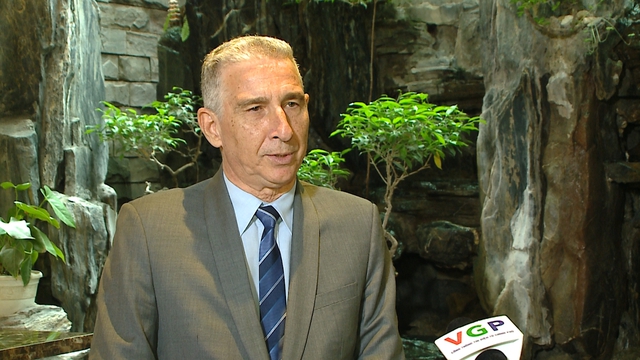AmCham Chairman: PM’s upcoming visit to U.S. creates chance to expand trade ties
VGP - Prime Minister Pham Minh Chinh’s attendance at the Special ASEAN-US Summit and working visit to the U.S. create big opportunities for the two nations to expand their trade, said Chairman of the American Chamber of Commerce (AmCham) John Rockhold in a recent interview with the VGP.

Chairman of the American Chamber of Commerce (AmCham) John Rockhold
Last year, the Vietnamese Prime Minister and U.S. President Joe Biden had a meeting on the sidelines of the 26th UN Climate Change Conference of the Parties (COP26) in Glasgow, the United Kingdom. However, this time will be the first in-person meeting of the both sides' leaders, neither in a third nation nor on the sidelines of a conference.
Rockhold highlighted the significance of the visit, noting that the U.S. attaches importance to the relationship with Asian nations, particularly ones in Southeast Asia.
Viet Nam is the key to any country expecting to get access to the economically dynamic Southeast Asian region. Thus, Rockhold hoped that, thanks to the visit, both nations will foster trade and economic ties in a more effective, practical, and balancing manner.
The energy sector will be an area that can help to balance trade between Viet Nam and the U.S., according to Rockhold.
U.S.-Viet Nam bilateral trade is a big success story
The trade is a big success story, underscored John Rockhold, adding that the two-way trade value increased around 250 times over the last 26 years, from US$450 million in 1995 to over US$111 billion in 2021.
Cooperation in agriculture is a spotlight in the two countries' economic ties as more American farm products are exported to Viet Nam and vice versa.
Over the first four months of 2022, the Southeast Asian nation gained nearly US$4.9 billion from exporting agro-aquatic-forestry products to the U.S., accounting for 27.3 percent of the country's total farm export value.
Regarding the operation of U.S. firms in Viet Nam, Rockhold said that a number of U.S. companies are struggling to come out of the COVID-19 pandemic.
The Vietnamese Government is trying to prioritize the infrastructure projects and also making incentives so that more American companies can come back and start investing in Viet Nam, especially in manufacturing, tourism and energy, he added.
For example, GE, a long-term partner in supporting Viet Nam's energy transition by bringing its innovative technology to support Viet Nam in its efforts to power households with sustainable energy, is picking up and doing very well in the country.
Meanwhile, AES Viet Nam has announced new corporate branding, accompanied by new product offerings in solar energy and battery storage. The companies like First Solar are making solar panels in the south, and Excelerate Energy who recently opened their representative office in Viet Nam.
More and more American companies are looking to Viet Nam as a place where they can come for investment. In general, American companies are optimistic about investing and expanding operation in Viet Nam, emphasized the AmCham Chairman.
Energy-key sector for future bilateral cooperation
According to Rockhold, the AmCham highlights corporate social responsibility (CSR) and over 60 companies received the CSR awards. During the COVID-19 period, these companies came forward and helped Viet Nam with medical supplies.
CSR is playing a crucial role for American companies and the U.S. firms have pledged to support Viet Nam in reaching its commitments at the COP26.
In the view of most American investors, the most important factor for a favorable U.S. investment climate and maintenance and growth of manufacturing supply chains is a fair, transparent and predictable regulatory environment that values innovation - not only to attract new investment but also to maintain and grow the investment already here.
They see financial sector reforms that will lead to U.S. investment into the Vietnamese Market versus Frontier Market status for Viet Nam. They also encourage reforms to attain an investment-grade sovereign rating for Viet Nam. Both are important steps to attract U.S. capital inflows.
Greater transparency and predictability in Viet Nam's tax system would strengthen Viet Nam's investment climate, particularly avoidance of retroactive rulings and assessments.
They encourage Viet Nam to seek mutual ratification and implementation of a bilateral tax treaty with the U.S. and to avoid double taxation of American citizens working here in the interim.
Rockhold expressed his belief that the progress on Viet Nam's energy transition will generate many benefits for the broader economy and help meet the commitments you made at the Global Climate Conference in Glasgow.
The draft Power Development Planning VIII (PDP8) and the whole of government approach and the views to energy growth from many angles: access to finance, tax policy, reducing use inefficiency, public education, carbon emissions, bankability, need for transmission, storage and innovation will do much to bring in new U.S. investments and trade.
The pandemic has also highlighted the importance of other infrastructure including ports, airports, roads, and bridges, and assessment of routes from Viet Nam to the U.S.
Infrastructure projects contributing to clean air, clean water, and a clean environment can bring benefits for investment, trade, and travel alike and American nvestors have the technology, know-how and financing.
Human infrastructure is also important and American investors are committed to helping develop a globally competitive workforce in Viet Nam. They are already supporting the upgrading of vocational training programs as key to skilled labor needs.
American investors are optimistic about the future in Viet Nam. They believe that substantive progress on the issues raised above will enable a sound and resilient investment environment and support Viet Nam's aspirations to propel itself to the next sphere of economic competitiveness, affirmed the AmCham Chairman./.
